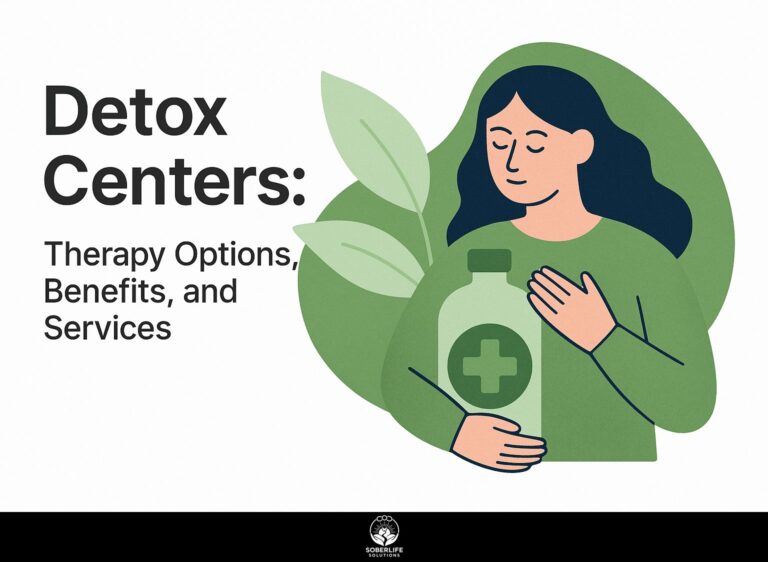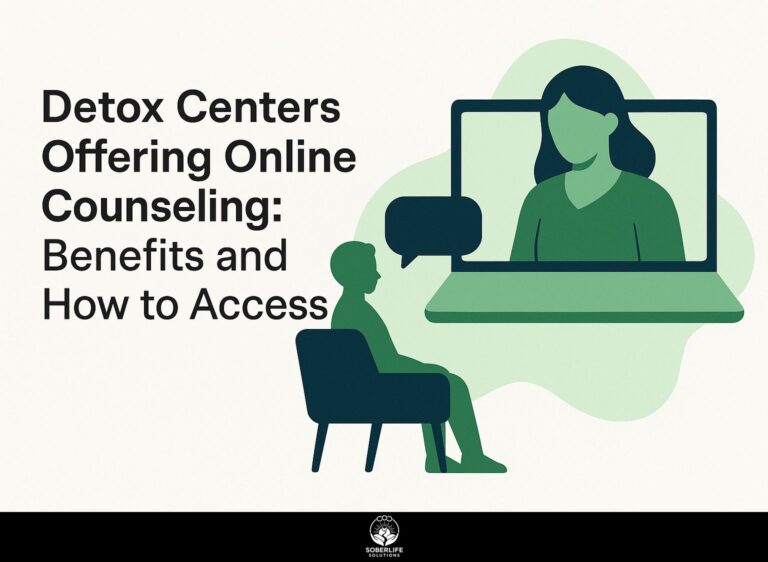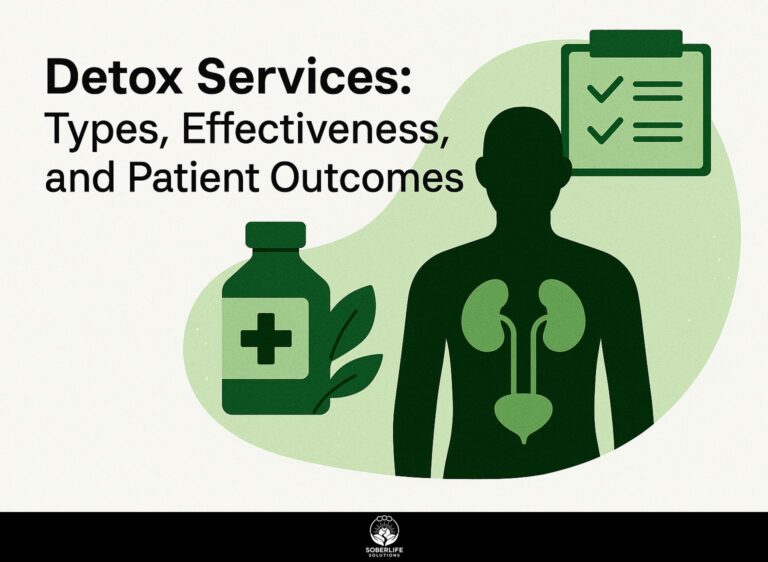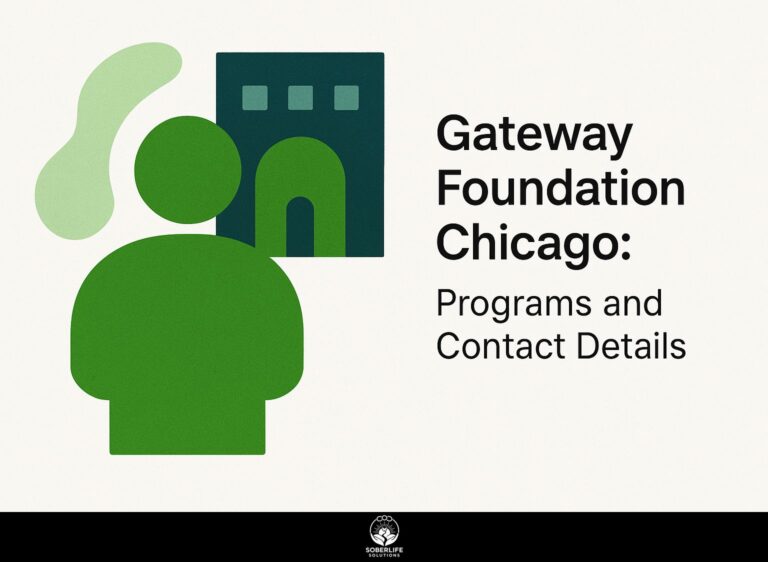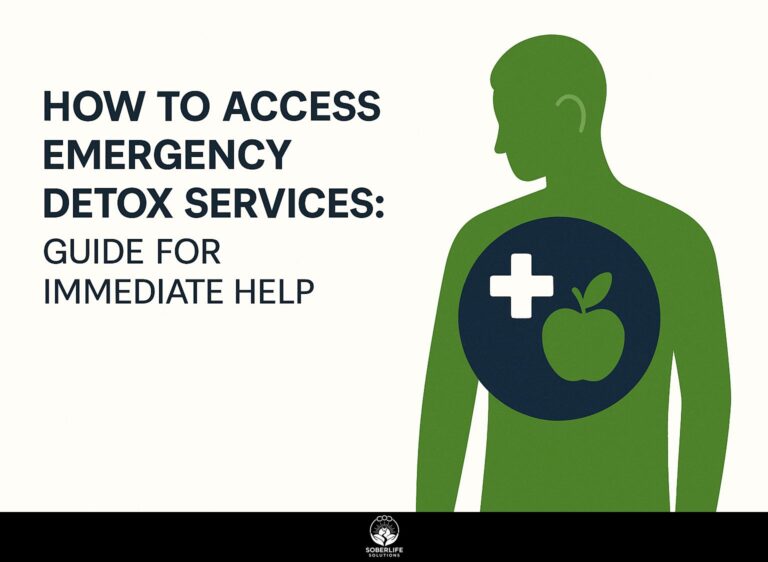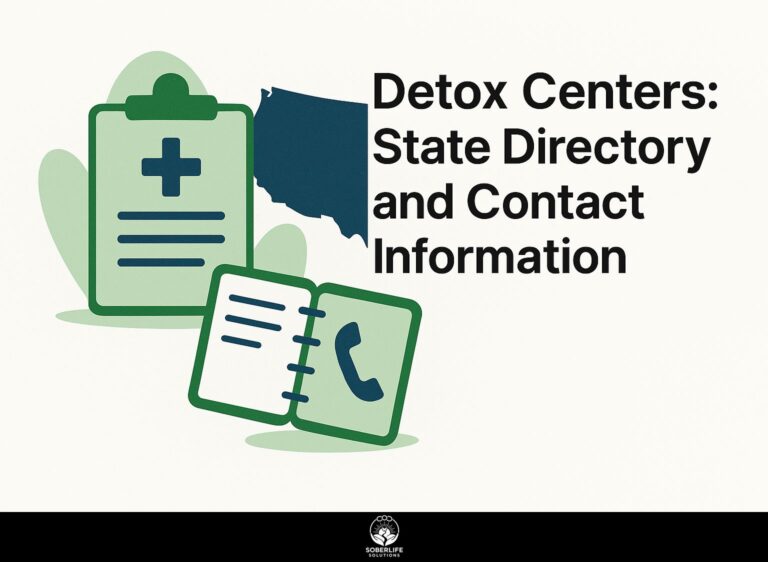Peer Support in Detox Centers: Definition, Role, and Impact
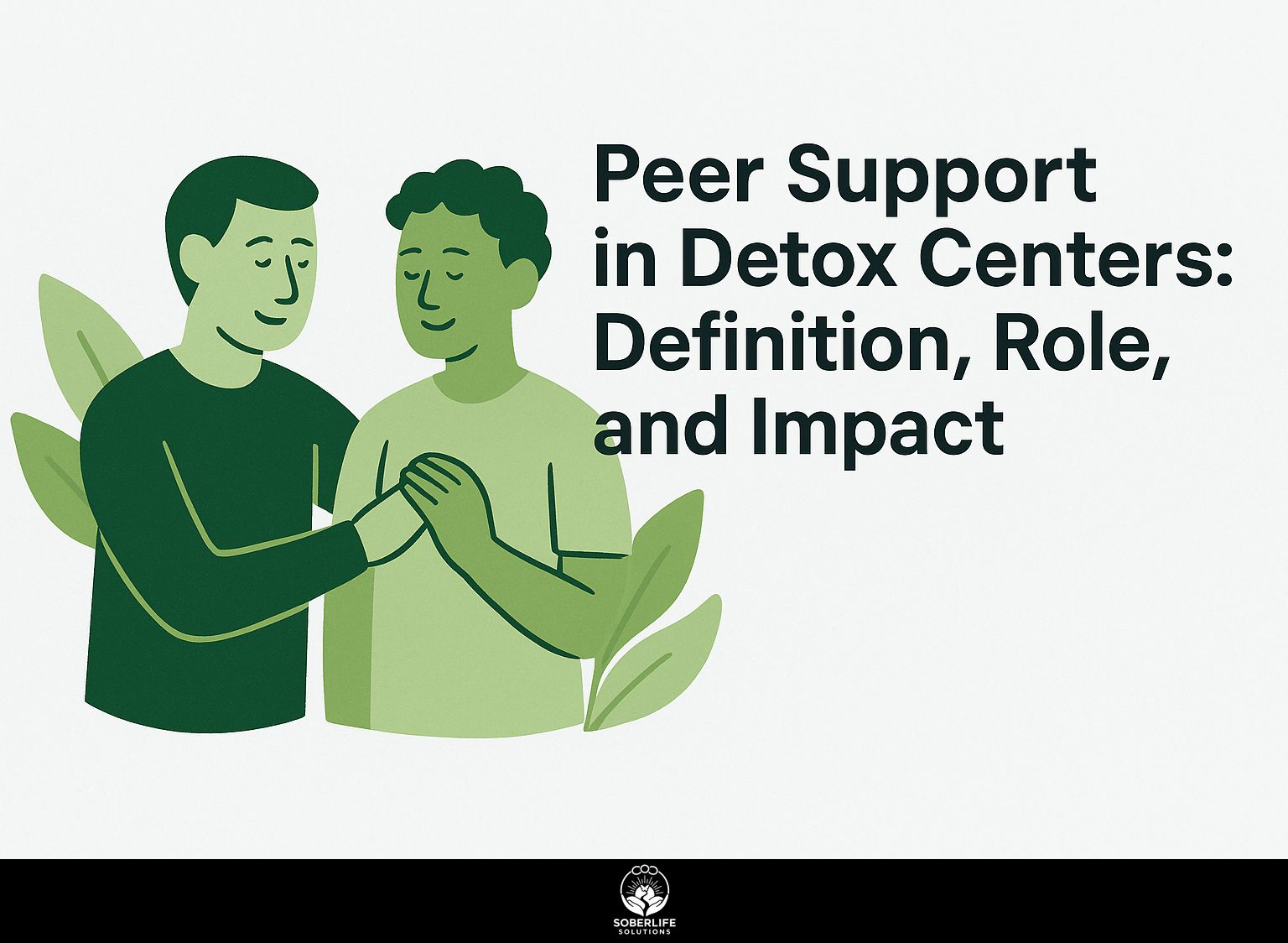
In detox centers, peer support is very important for helping people recover. These programs provide emotional support and helpful advice, creating a strong community for people dealing with similar issues. This article explains what peer support is, how it helps in treatment settings, and the impact it has, showing how these relationships can greatly improve recovery and lead to lasting changes.
Key Takeaways:
Definition and Overview
Peer support involves people working together by sharing their knowledge, experiences, and resources to help each other recover from substance use disorders.
This help can appear in various ways, creating a feeling of togetherness for those involved.
For instance, support groups like Alcoholics Anonymous (AA) provide a space for individuals to share their stories, allowing members to connect through shared struggles and successes.
Websites like SMART Recovery offer help and let people connect with others around the world. Mutual aid networks often help set up mentor relationships, building stronger ties that increase responsibility and support long-term recovery. According to a comprehensive study published by Taylor & Francis, members of mutual aid groups often experience enhanced recovery outcomes, emphasizing the value of these networks in supporting sustained recovery.
Historical Context
The roots of peer support can be traced back to grassroots movements like Alcoholics Anonymous, which began in the 1930s and emphasized the power of shared experiences in recovery.
Since its inception, the concept of peer support has expanded significantly. In the 1960s and 1970s, movements for mental health advocacy and support groups flourished, drawing inspiration from AA’s model.
Organizations like Nar-Anon emerged, providing similar support for families of those struggling with addiction. By the 1990s, attention expanded to include mental health and long-term illnesses, leading to the creation of programs that highlighted the value of personal experiences, like peer specialist training.
Today, peer support is part of many health systems, providing structured programs that help people through shared knowledge and connections – a development that aligns with historical insights from Wikipedia on Alcoholics Anonymous.
The Role of Peer Support in Detox Centers
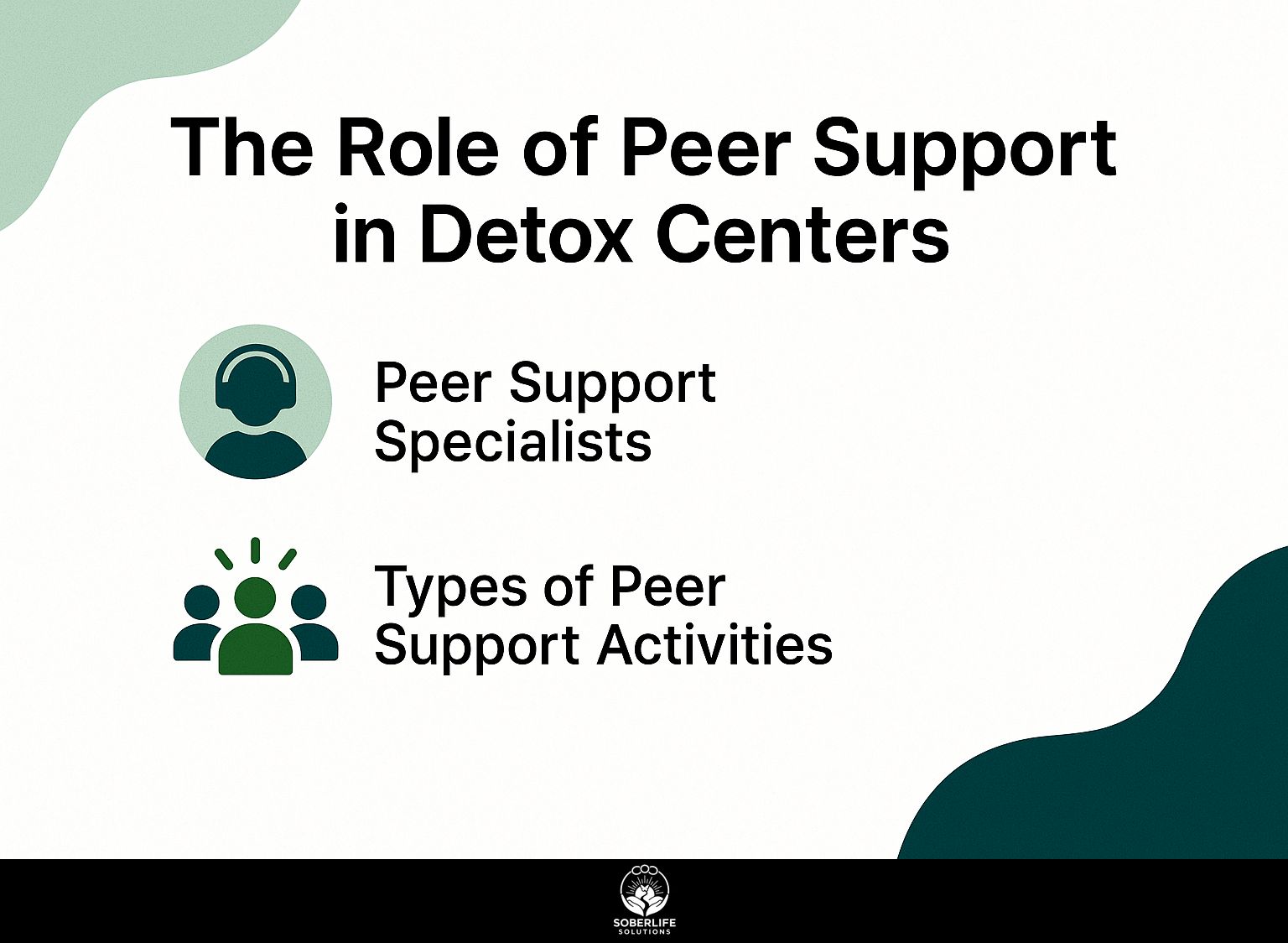
In detox centers, peer support plays an important role by giving people the emotional and practical help they need to get through the early steps of recovery. This approach aligns with the principles outlined in our analysis of how to build a support network effectively.
Peer Support Specialists
Peer support specialists are important in detox centers. They help by giving advice, leading talks, and offering continuous support that fits each person’s path to recovery.
Trained in effective communication, these specialists often share their own recovery stories to inspire hope and resilience. They may lead group sessions, helping clients learn how to manage stress by practicing mindfulness or addressing triggers.
Tools like motivational interviewing techniques make them more effective, promoting honest conversation. According to the Department of Human Services, comprehensive peer support training equips specialists with these tools, enabling them to work collaboratively with medical staff to develop individual support plans.
This combination of personal experience and professional training helps create trust and a feeling of community, which is important for lasting recovery success.
Types of Peer Support Activities
Activities such as group therapy sessions, one-on-one mentoring, and community outreach initiatives form the backbone of effective peer support programs.
These programs usually have organized group meetings where people discuss their experiences and ways to manage them, helping create a feeling of community.
For example, the Matrix Model, used in many detox centers, mixes education and shared stories to create a caring setting. Mentorship pairs newcomers with experienced individuals who guide them through recovery challenges.
Programs like SMART Recovery help people by focusing on self-control and motivation, teaching skills needed to stay sober. An essential aspect of such programs is the support network they foster- peer support groups offer tremendous benefits and activities that bolster recovery efforts. These parts help build a strong support system that is important for long-term recovery.
Benefits of Peer Support
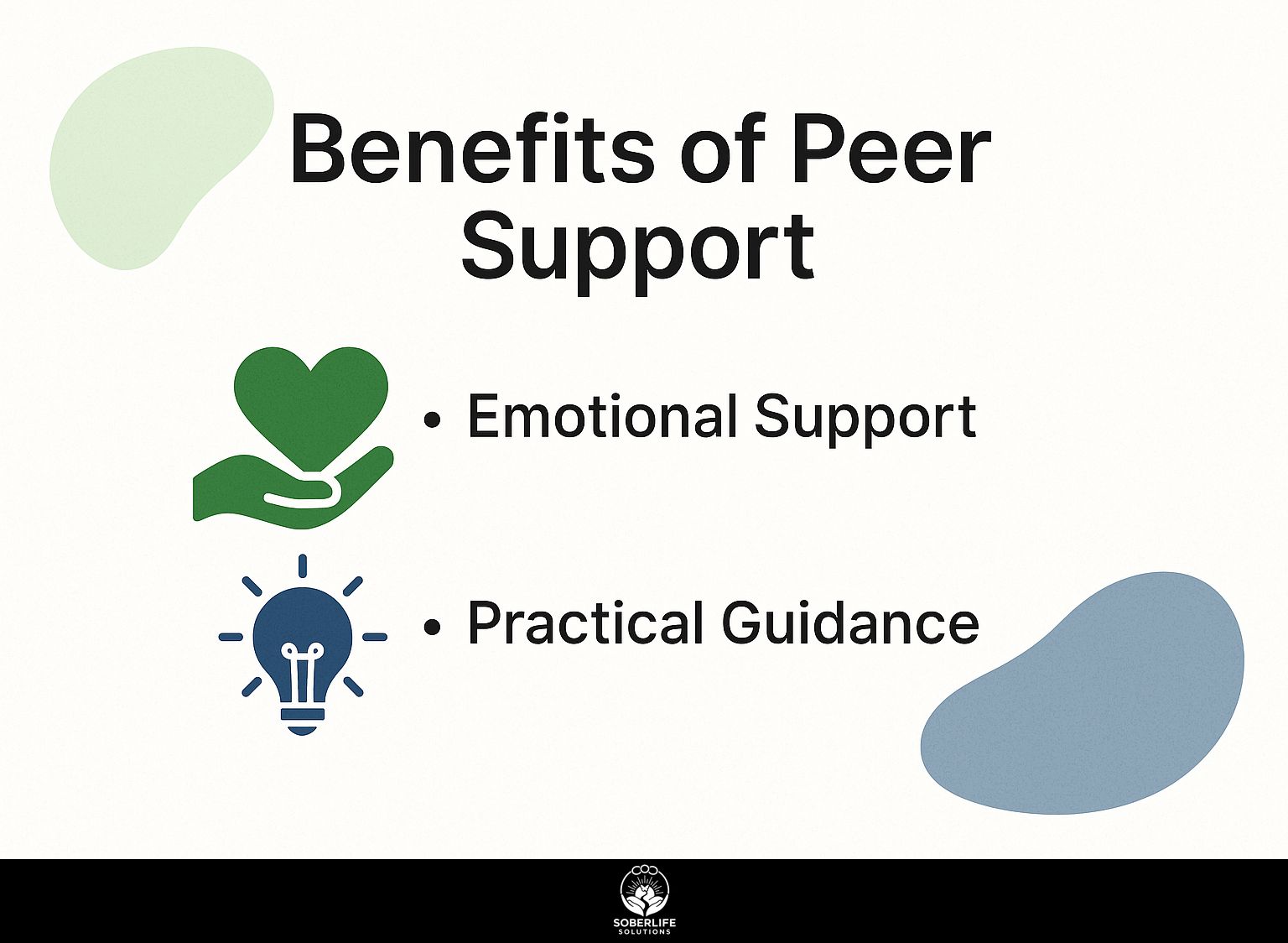
Peer support has been shown to improve emotional health and offer practical advice, leading to better recovery results and long-term sobriety. For young adults, engaging in peer support groups tailored specifically to their needs can provide even more personalized support.
Emotional Support
Getting emotional support from friends makes people feel listened to and not alone, which is important for dealing with mental difficulties during healing.
Joining support groups like Alcoholics Anonymous or SMART Recovery can help lower stress by connecting people with shared experiences. These groups allow members to share their challenges and successes, creating a sense of community.
Partnering with a recovery buddy can provide daily motivation and accountability. Apps for tracking progress can strengthen emotional connections by recognizing and sharing achievements together.
When people talk about their experiences, they lighten their own load and help others, which can greatly lower the chance of falling back into old habits.
Practical Guidance
Practical guidance from peers includes sharing coping strategies and access to community resources that are essential for successful long-term recovery.
Peers often emphasize techniques such as mindfulness meditation, which can help manage anxiety and promote emotional stability. For instance, a weekly group meditation session can provide accountability and reinforce these skills.
Peers might exchange local resources, like support groups or workshops, that focus on specific issues like job training or mental health counseling. Using platforms like Meetup can help find local events where people can join and learn together.
This shared experience helps people support each other and gives them practical tools to help with their recovery.
Challenges and Limitations
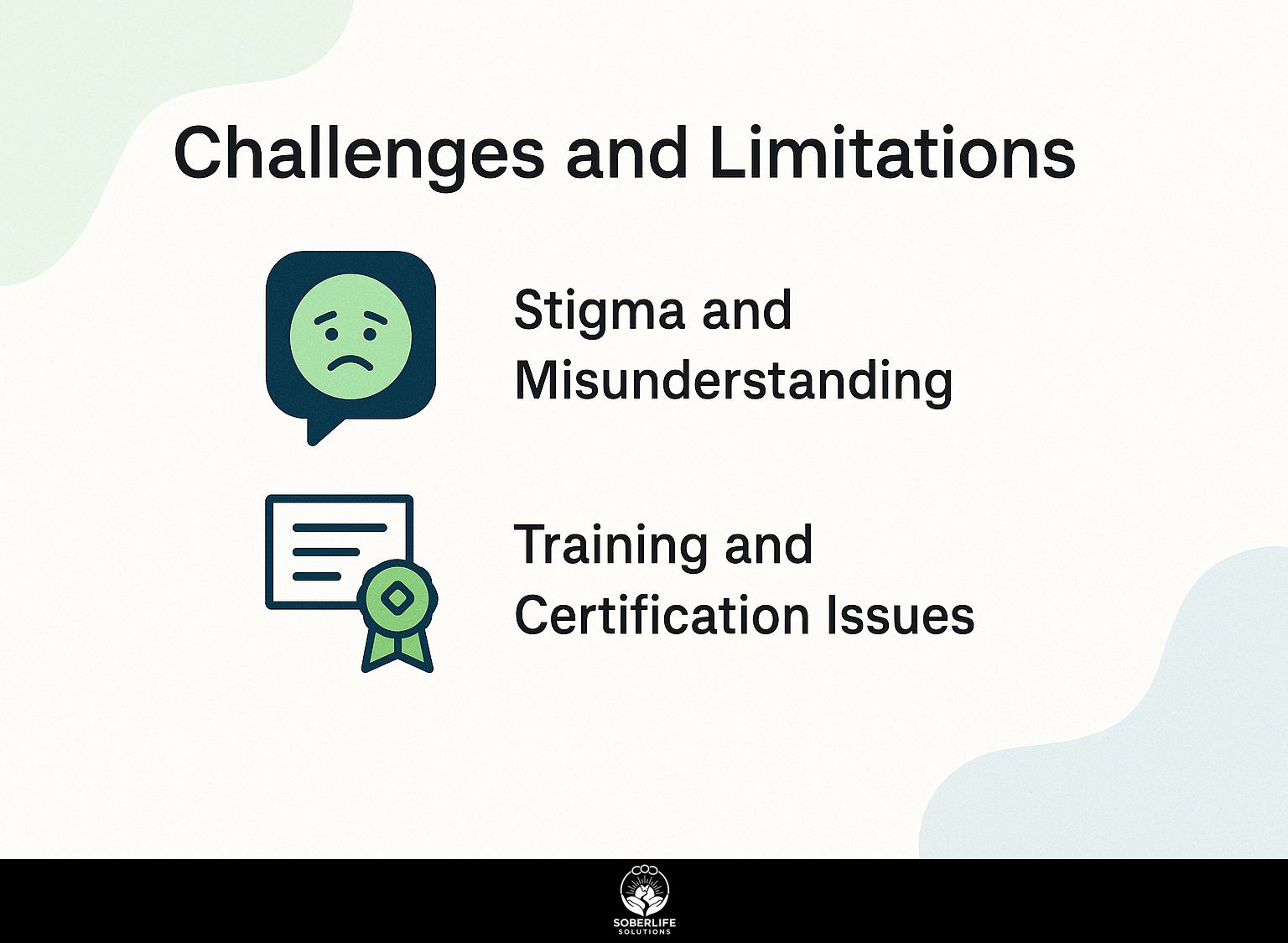
Even though it offers benefits, peer support faces problems like stigma, misconceptions, and insufficient training, which can limit its success in recovery environments. Those curious about overcoming these challenges might appreciate our complete guide to joining and running peer support groups.
Stigma and Misunderstanding
Negative stereotypes about addiction and mental health problems often lead to confusion, which can harm the standing of peer support groups.
To combat stigma, prioritize education within communities about addiction as a health issue rather than a moral failing.
Organizing workshops that feature personal stories from individuals in recovery can humanize the experience, while resources like NAMI (National Alliance on Mental Illness) offer excellent training materials for professionals and community leaders.
Promoting advocacy initiatives encourages open dialogue, helping dismantle stereotypes. Motivating local groups to use language that includes everyone in their materials fosters a friendly atmosphere, helping peer support become more available and useful.
Training and Certification Issues
Inconsistent training and certification for peer support specialists can result in varying levels of effectiveness and commitment within support programs.
To improve the skills of peer support specialists, using consistent training guidelines is essential.
Recommended training programs such as the Psychiatric Rehabilitation Association (PRA) certification and the Mental Health First Aid (MHFA) course offer structured education and practical skills. Ongoing workshops on communication methods and crisis handling can improve skills.
Organizations should also establish clear certification standards, such as requiring a minimum number of supervised hours and periodic re-certification, ensuring that all specialists maintain a high level of competency and support quality.
Impact on Recovery Outcomes
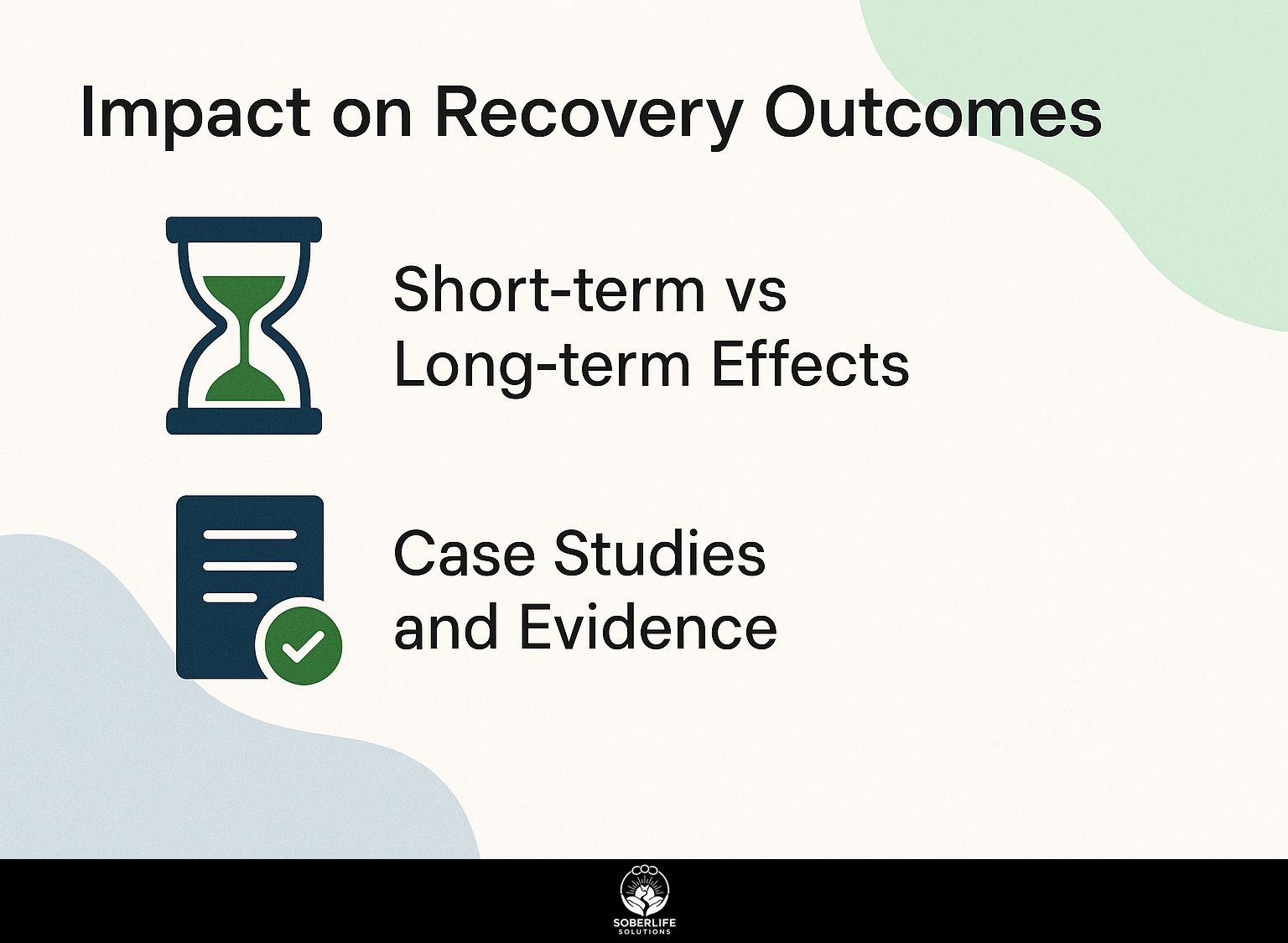
Peer support clearly helps improve recovery results, affecting both short-term stability and long-term sobriety for people undergoing treatment. To further enhance your recovery journey, consider the benefits of joining virtual recovery groups that are currently trending, offering additional support and connection.
Short-term vs Long-term Effects
Research indicates that while short-term effects of peer support are immediate emotional relief, long-term effects include sustained recovery and reduced relapse risks.
A study by the Substance Abuse and Mental Health Services Administration found that individuals in peer support groups reported a 25% lower rate of relapse compared to those without such support.
These groups promote responsibility and motivation, helping members tackle challenges together. Regular meetings help build social connections, which are important for mental health.
Participating in nearby support groups or online communities can create a strong network of help, providing quick relief and long-term recovery advantages.
Case Studies and Evidence
Various examples show how peer support can improve treatment results in different addiction services and recovery programs.
For instance, a study from a Seattle-based recovery center found that participants in peer-led support groups showed a 30% higher sobriety rate than those who attended traditional therapy alone.
Another case from a New York program revealed that 75% of peers reported increased engagement in recovery activities, with many participating in community outreach.
These initiatives often use platforms like 7 Cups for online support, helping users connect and stay responsible. Such metrics highlight the potential of peer support to create sustainable recovery pathways.
Frequently Asked Questions
What is peer support in detox centers?
Peer support in detox centers involves people who have completed detox and are in recovery helping others who are currently in detox by offering support, advice, and motivation.
What is the role of peer support in detox centers?
Peer support in detox centers helps individuals by offering specific guidance and empathy during the detox process. Peers use their own lived experiences to offer guidance, motivation, and hope to those in need.
How does peer support impact individuals in detox centers?
Peer support greatly affects people in detox centers by offering them a feeling of community and empathy. It makes people feel supported and encourages them to keep working on getting better.
Can anyone become a peer supporter in a detox center?
Yes, anyone who has gone through the detox process and is in a stable state of recovery can become a peer supporter in a detox center. This can be a powerful way for individuals to give back and help others in need.
What makes peer support in detox centers different from other forms of support?
Peer support in detox centers is unique because it is based on people having similar experiences and knowing what each other is going through. Peers give hope and motivation by demonstrating that getting better is achievable and that they have experienced similar situations.
How can peer support in detox centers benefit the overall detox process?
Peer support in detox centers can benefit the overall detox process by reducing feelings of isolation and stigma, promoting motivation and accountability, and increasing overall success rates of detox and recovery. It also helps to create a caring and encouraging space for individuals going through detox.

